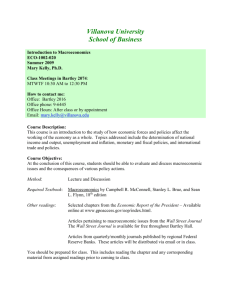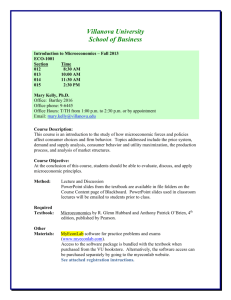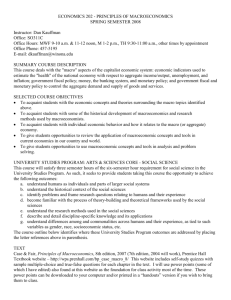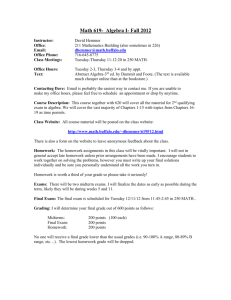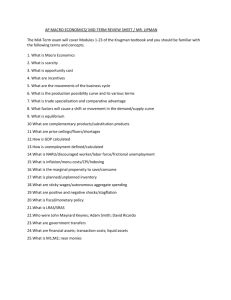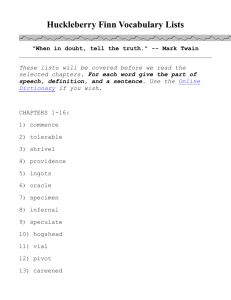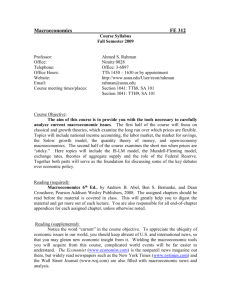Villanova University
advertisement
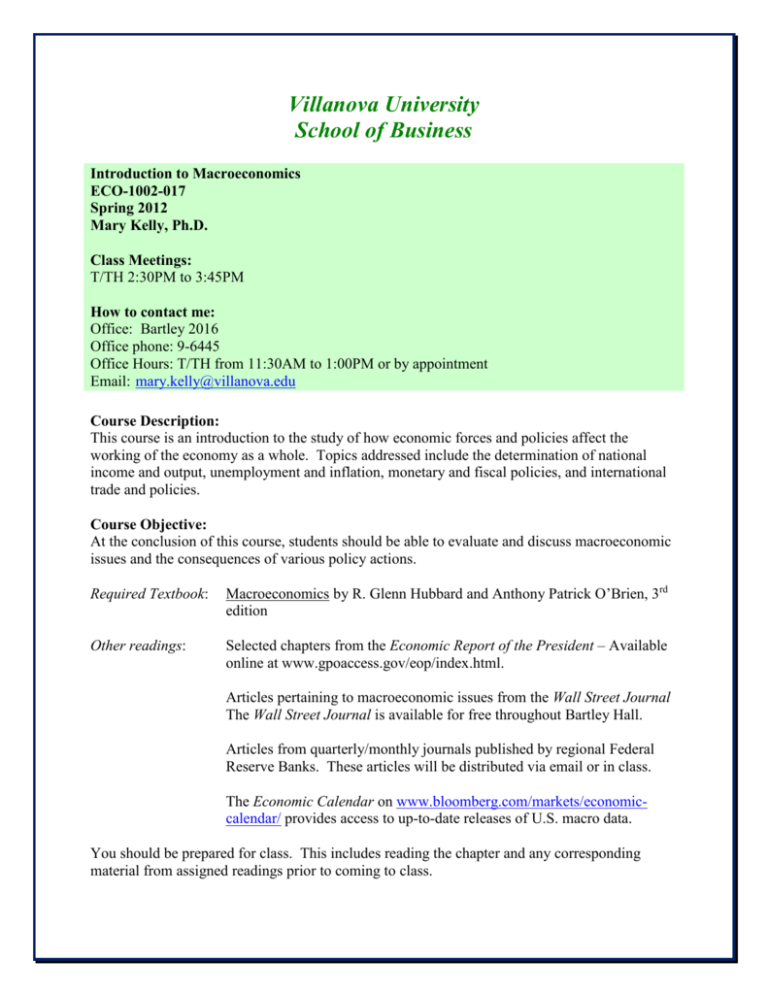
Villanova University School of Business Introduction to Macroeconomics ECO-1002-017 Spring 2012 Mary Kelly, Ph.D. Class Meetings: T/TH 2:30PM to 3:45PM How to contact me: Office: Bartley 2016 Office phone: 9-6445 Office Hours: T/TH from 11:30AM to 1:00PM or by appointment Email: mary.kelly@villanova.edu Course Description: This course is an introduction to the study of how economic forces and policies affect the working of the economy as a whole. Topics addressed include the determination of national income and output, unemployment and inflation, monetary and fiscal policies, and international trade and policies. Course Objective: At the conclusion of this course, students should be able to evaluate and discuss macroeconomic issues and the consequences of various policy actions. Required Textbook: Macroeconomics by R. Glenn Hubbard and Anthony Patrick O’Brien, 3rd edition Other readings: Selected chapters from the Economic Report of the President – Available online at www.gpoaccess.gov/eop/index.html. Articles pertaining to macroeconomic issues from the Wall Street Journal The Wall Street Journal is available for free throughout Bartley Hall. Articles from quarterly/monthly journals published by regional Federal Reserve Banks. These articles will be distributed via email or in class. The Economic Calendar on www.bloomberg.com/markets/economiccalendar/ provides access to up-to-date releases of U.S. macro data. You should be prepared for class. This includes reading the chapter and any corresponding material from assigned readings prior to coming to class. Grading: Requirements Exams I (Chapters 2, 3, 6, and 7) II (Chapters 8 through 11) III (Chapters 12 through 15) FINAL (Chapters 7 through 16, Discussions of macro measurements and international econ comparisons) Macro Measurements Assignment International Presentations Total Points Grade = Total Points/2 Begins at 94 90 87 84 80 77 Grade A AB+ B BC+ Begins at 74 70 67 64 60 Below 60 Points Due Date(s) 30 40 40 50 20 20 200 February 14 March 20 April 12 May 7 from 11:30AM to 2:00PM April 26 May 3 100 Grade C CD+ D DF Grading is determined based on the specified criteria. There is NO INDIVIDUALIZED EXTRA CREDIT offered in this course.* Rounding up or down is based on class participation. *ExCr offered to entire class: EconNova Blog and attendance at presentations by external speakers. Exams: There are four exams during the term, including a semi-cumulative final. Exams must be taken on the scheduled dates. Make-up exams will be offered only for extenuating circumstances and must be taken within two days of the scheduled exam date.* *A 5 to 10 point penalty may be assessed if the exam is not taken when scheduled. Macro Measurements Assignment: Each student will collect and analyze data for the U.S. economy. For each variable (shown below), prepare a table and graph and comment on what you observe. The table and graph should be integrated into a five-page Microsoft Word document that accompanies the commentary about the data. Page 1 2 3 4&5 Macro Variable Frequency and Time Period % Δ in Real GDP Quarterly, 1Q00 to 4Q11 Unemployment Monthly, 1/2006 to 3/2012 Inflation Rate (% Δ CPI) Monthly, 1/2006 to 3/2012 Two additional variables (your choice) ???? Data Source www.bea.gov www.bls.gov www.bls.gov ???? International Economics Assignment: In groups of five or six, students will prepare an economic analysis for one of the following countries: Ireland, Germany, France, United Kingdom, or Italy. In a 15 minute presentation to the class, provide a “state of the country” analysis. In your analysis, be sure to discuss the following: Macro Variable or Topic Economic Growth (% Δ in Real GDP) Unemployment Inflation Rate (% Δ CPI) Monetary and Fiscal Policies Government Deficit (Debt) Major Issues (short run and long run) Classroom Etiquette: It is expected that students will display courtesy and respect for each other during class. Students are expected to arrive on time and to remain until the class ends. Unless it is an emergency, bathroom breaks should be taken before or after class. Please turn off all cell phones prior to the start of class. The computer is for coursework only. Please do not surf the web, check Facebook, or answer emails during class. Integrity Policy: The Code of Academic Integrity of Villanova University addresses cheating, fabrication of submitted work, plagiarism, handing in work completed for another course without instructor’s approval, and other forms of dishonesty. For the first offense, a student who violates the Code of Villanova University will receive 0 points for the assignment. The violation will be reported by the instructor to the Dean’s Office and recorded in the student’s file. In addition, the student will be expected to complete an educational program. For the second offense, the student will be dismissed from the University and the reason noted on the student’s official transcript. Disability Statement: It is the policy of Villanova to make reasonable academic accommodations for qualified individuals with disabilities. If you are a person with a disability, please contact me after class or during office hours and make arrangements to register with the Learning Support Office by contacting 610-519-5636 or nancy.mott@villanova.edu as soon as possible. Registration is needed in order to receive accommodations. Course Outline (subject to change): Weeks 1-2 (1/17 - 1/26) Material Review of syllabus Chapter 1 - Economics: Foundations and Models Chapter 2 - Tradeoffs, Comparative Advantage, and the Market System Chapter 3 – Where Prices Come From: The Interaction of Demand & Supply 3-4 (1/31 – 2/9) Chapter 6 – Comparative Advantage and the Gains from International Trade Chapter 7 – GDP: Measuring Total Production and Income Access GDP data (www.bea.gov) 5 (2/14) 6-7 (2/21 – 3/1) EXAM I (Chapters 2, 3, 6, and 7) on Tuesday, February 14 Chapter 8 – Unemployment and Inflation Chapter 9 – Economic Growth, the Financial System, and Business Cycles Access unemployment and inflation data (www.bls.gov) Access business cycle data (www.nber.org/cycles.html) 8 SPRING BREAK 9-10 Chapter 10 – Long Run Economic Growth: Sources and Policies (3/13 – 3/15) Chapter 11 – Output and Expenditure in the Short Run Chapter 11 (appendix) – The Algebra of Macroeconomic Equilibrium 10 (3/20) 10 3/22 EXAM II (Chapters 8 through 11) on Tuesday, March 20 Chapter 12 – Aggregate Demand and Aggregate Supply Analysis Chapter 12 (appendix) - Macroeconomic Schools of Thought 11-13 Chapter 13 – Money, Banks, and the Federal Reserve System (3/27 – 4/10) Chapter 14 – Monetary Policy Chapter 15 – Fiscal Policy 13 EXAM III (Chapters 12 through 15) on Thursday, April 12 4/12 14-15 Chapter 16 – Inflation, Unemployment, and Federal Reserve Policy (4/17 – 4/24) Minutes from the most recent FOMC meeting (www.federalreserve.gov/fomc/minutes/) 15 (4/26) Overview of international trade and finances Macro Measurements assignment due - discussion 16 (5/03) 17 International Econ presentations FINAL EXAM on May 7 at 11:30AM (Chapters 7 – 16, macro measurements and internat’l presentations)
